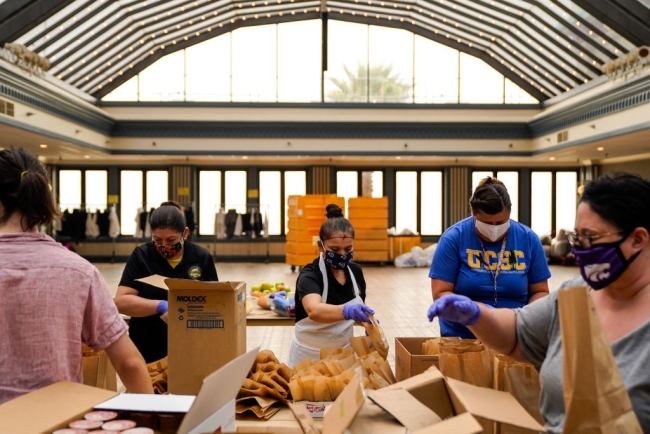You have /5 articles left.
Sign up for a free account or log in.

Kent Nishimura/Contributor via Getty Images
As if the COVID-19 pandemic isn’t a big enough challenge on its own, colleges in California, Texas and Louisiana are preparing to weather hurricanes and fires, and in some cases evacuate students who have just returned to campus for the fall semester.
More than 7,000 wildfires have raged in California since the beginning of fire season this month, scorching more than 1.6 million acres of land. Many of the fires were started by a lightning storm on Aug. 17 in the northern part of the state.
The CZU Lightning Complex fire -- ignited with a lightning strike on Aug. 16 -- is burning just a mile north of the University of California, Santa Cruz, campus. The fire is 19 percent contained.
The university encouraged students to evacuate proactively if they were able, according to Scott Hernandez-Jason, a university spokesperson. More than 40 students were evacuated to San José State University on Saturday, 36 miles northeast of the UC Santa Cruz campus.
“As we moved into the mandatory evacuation, we worked to do everything in a way that would align with COVID protections: masks, physical distancing and more,” Hernandez-Jason said in an email.
The students are staying on the eighth and ninth floors of San José State’s Campus Village Building 2, a first-year-only residence hall. Robin McElhatton, a San José State spokesperson, said on Monday that the university expects to house more students throughout the week. The university is working to keep its COVID-19 precautions in place while housing additional students on campus. The university has opted for mostly virtual instruction this fall.
“All existing university protocols for quarantine and isolation guidance must be followed by all occupants of residence halls,” McElhatton said in an email. “All students were placed in single rooms and have assigned bathrooms. Cleaning protocol remains the same with extra daily cleaning for bathrooms and high touch areas. All lounges and common areas remain closed.”
McElhatton said she’s unsure how long the Santa Cruz students will stay.
Other California fires have threatened several University of California buildings, including UC’s Lick Observatory and research facilities in the Landels-Hill Big Creek Natural Reserve.
Hurricanes in the Gulf
In Texas and Louisiana, colleges are preparing to face a different beast: hurricanes. Last weekend, it appeared that two major storms were approaching the Gulf Coast. Hurricane Marco was later downgraded to a tropical storm on Monday night and made landfall Tuesday at the mouth of the Mississippi River, bringing with it heavy rains.
Hurricane Laura has emerged to be the more threatening of the two; the storm was upgraded to a Category 4 on Wednesday, hurtling toward the northern part of the Gulf Coast with 140-mile-per-hour winds, storm surges that could reach up to 30 miles inland and up to 15 inches of rain in some areas. Hundreds of thousands of people have been ordered to evacuate parts of Texas and Louisiana, and the hurricane was predicted to make landfall sometime Wednesday night or Thursday morning.
College of the Mainland, a community college that sits near the Texas coast on Galveston Bay, canceled classes Tuesday through Friday of this week. The college opted to cancel virtual classes as well as in-person instruction in case students lose internet access as a result of the storm.
“The only significant difference that COVID-19 made for our storm response was that we reminded employees and students to consider their COVID-19 prevention needs as part of their personal emergency preparedness,” Monique Sennet, a spokesperson for the college, said in an email.
Alvin Community College canceled all classes on Wednesday and Thursday. The University of Houston-Clear Lake and its Pearland and Texas Medical Center campuses closed Wednesday and expect to reopen next Monday. San Jacinto College closed Tuesday and will remain closed through at least Thursday. Texas Southern University closed midday Wednesday and will reopen Friday. Galveston College has suspended remote and in-person operations indefinitely.
Tulane University had prepared to weather both storms over the weekend and canceled classes on Monday. Since, Marco was downgraded and Laura’s path has changed and will likely miss New Orleans.
Michael Fitts, president of Tulane, said that disaster readiness and COVID-19 precautions go hand in hand.
“Everything we do on campus has to take into account COVID-19,” he said. “For example, we built 13 new classrooms where students can be socially distanced and distanced from faculty, and all those classrooms are capable of withstanding a Category 3 hurricane.”
In some ways, COVID-19 preparations have made it easier for the university to respond quickly to a potential storm.
“The value of COVID is that all classes have online capacity,” Fitts said.
He also stressed the importance of providing mental health support for students who may be anxious about the storms on top of already-existing COVID-19-related anxiety.
“This is a time of high anxiety for students across the country because of COVID-19. If we’re talking about a storm as well, especially for students who may not have experienced it, it’s really important that you provide support.”




